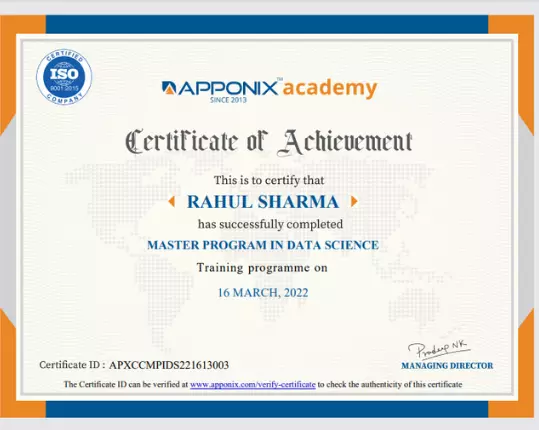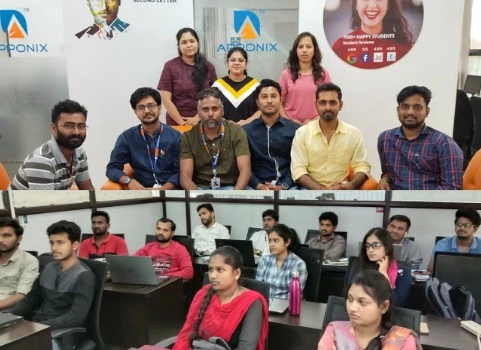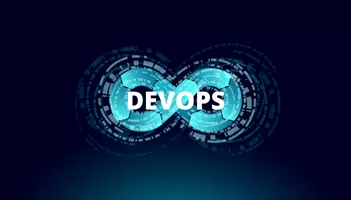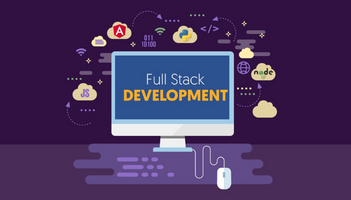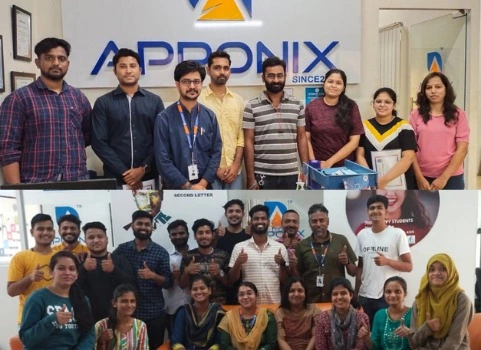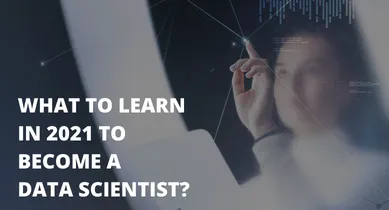Master Program in Data Science
Master Program in Data Science Master program online & offline Course - 6 Months with Guaranteed placement assurance.
2000+ Ratings
3000+ Happy Learners
Master Program in Data Science Videos
Skills Covered in Master Program in Data Science
Master Program in Data Science Training Key Features
Our Alumni Working in Master Program in Data Science



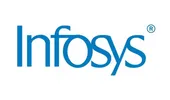



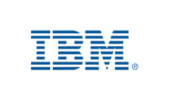

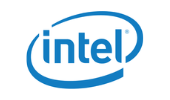


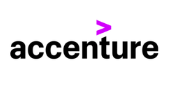



















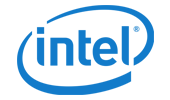



Master Program in Data Science Course Reviews
I joined Apponix for python classes. All trainers are very good, experienced with detailed Knowledge about the subject. I learned about the automation skills and all the concepts of Java here. The best part is that they provide each topics video after the class and clear all doubts if we have any.
The Trainer who teaches Python has immense knowledge about the subject and the training is friendly you can clarify your doubts in the class room itself, it's a complete hands on training given by the trainer which helped me to learn the course more effectively as well as easily. Python Course at VSS innovative technologies is highly recommended.
Excellent training facility. Trainer was having depth knowledge about his subject. Really very good institute for Python with best lab facility and good infrastructure. They provide real time training and placement assistance which is very good.
Our Recent Placements
Classroom Training
Classroom Training

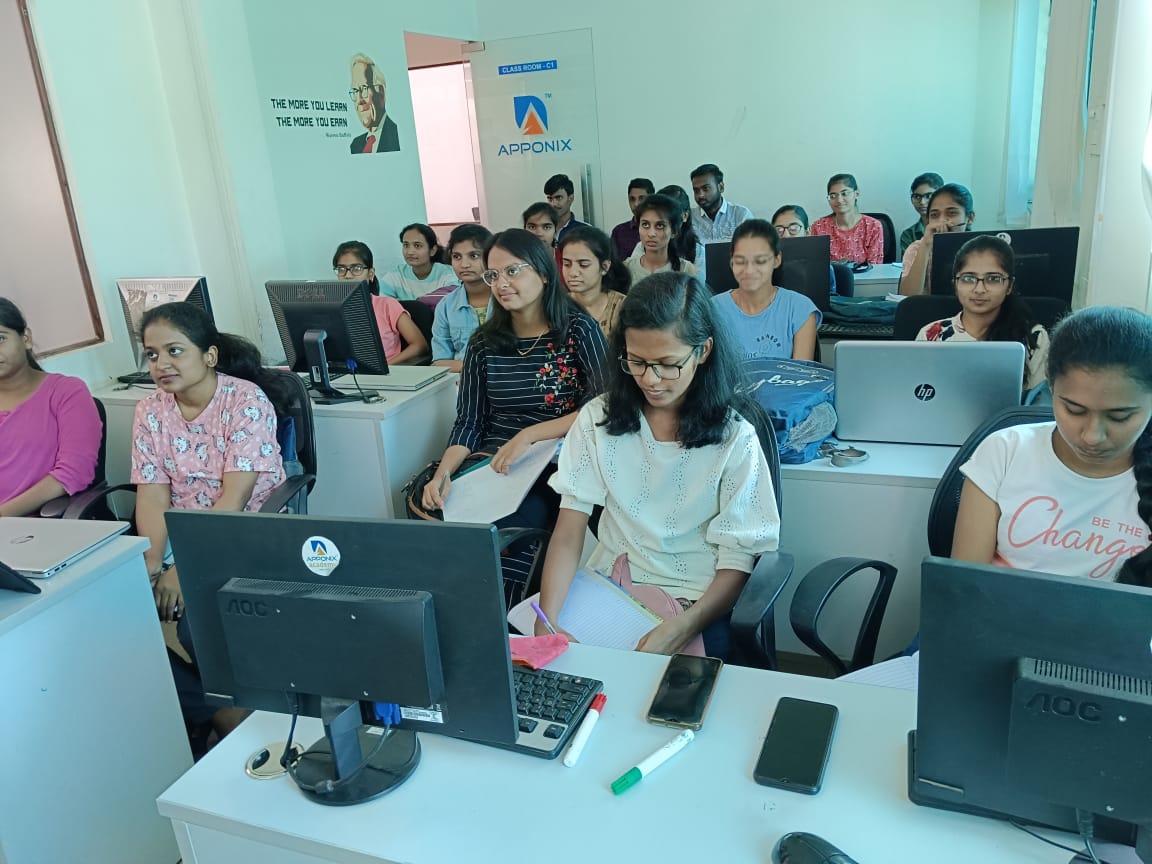
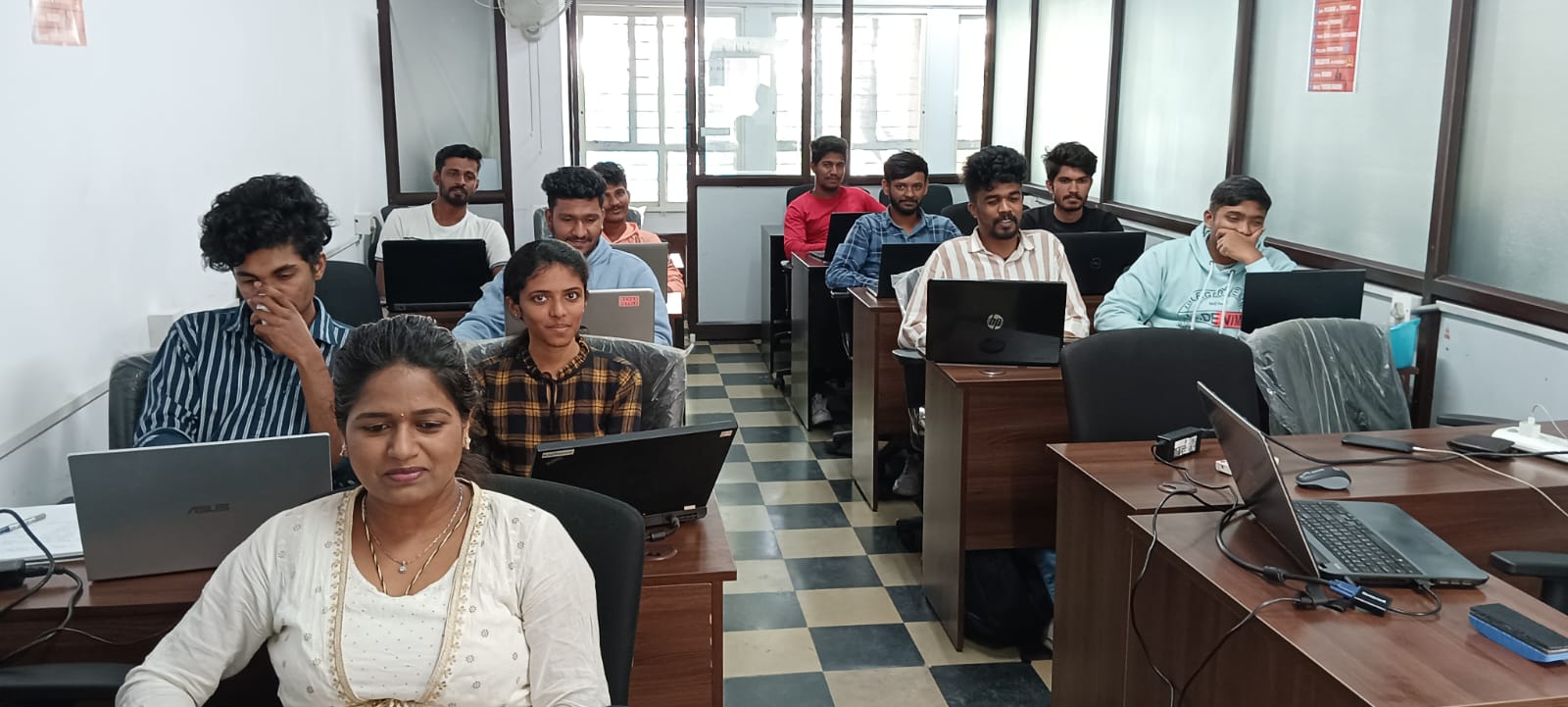
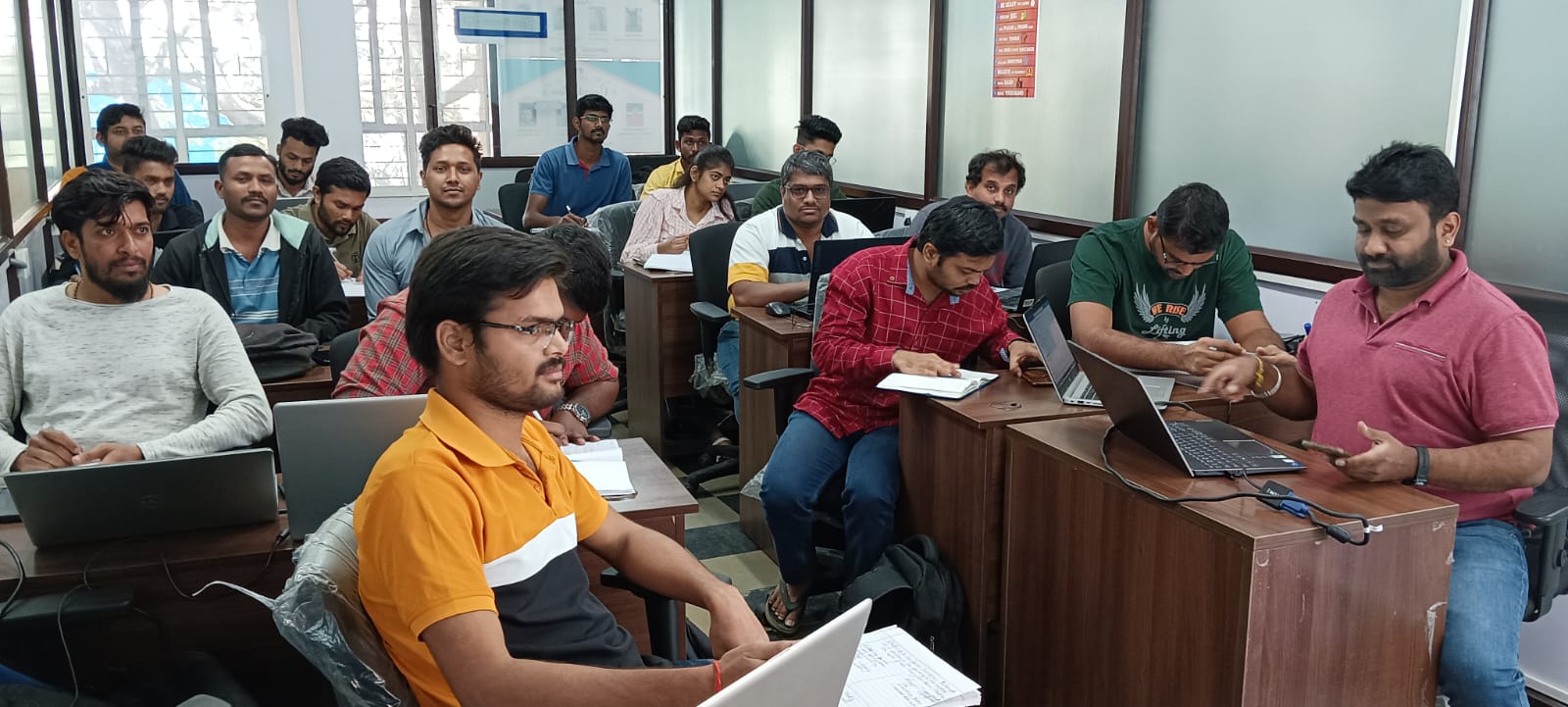
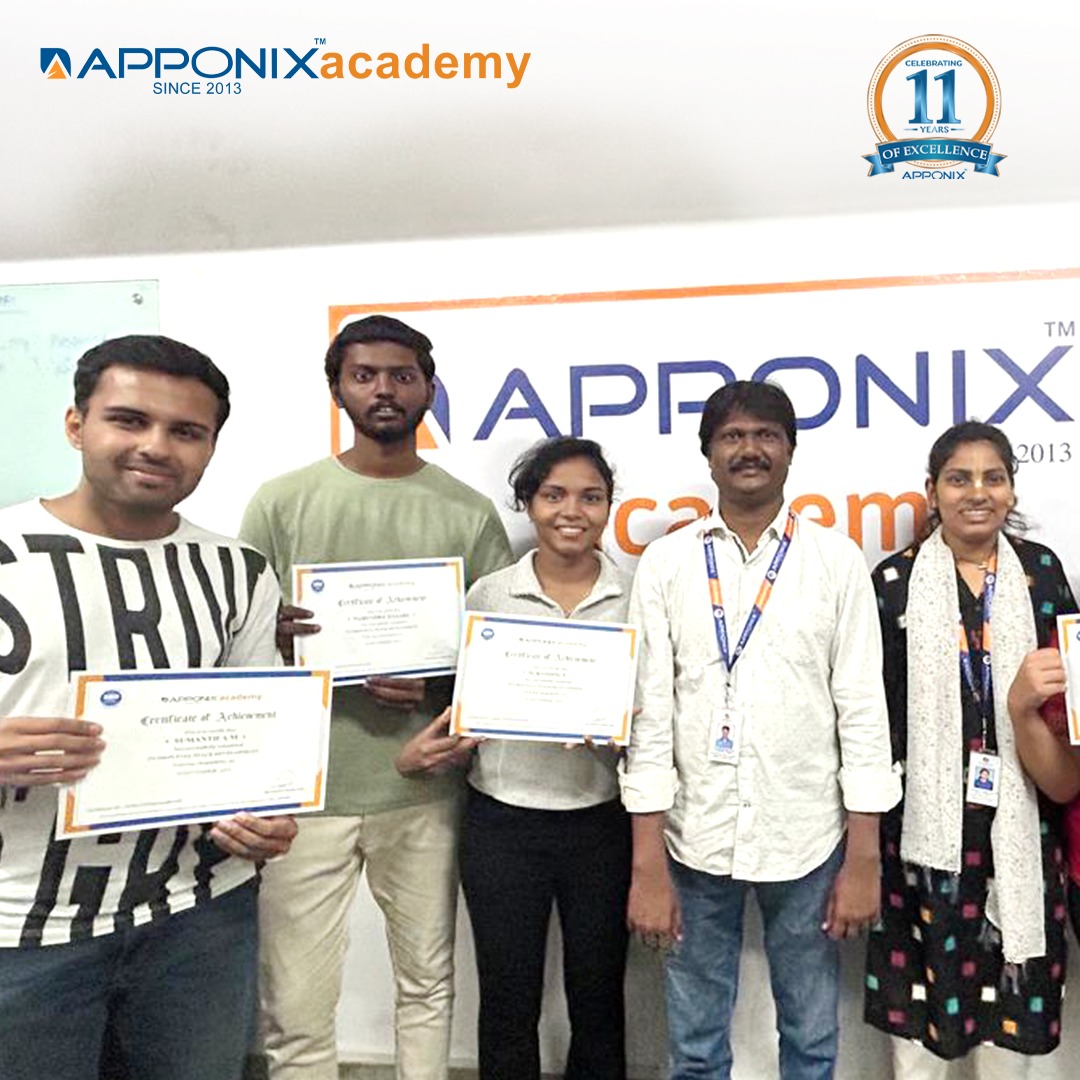

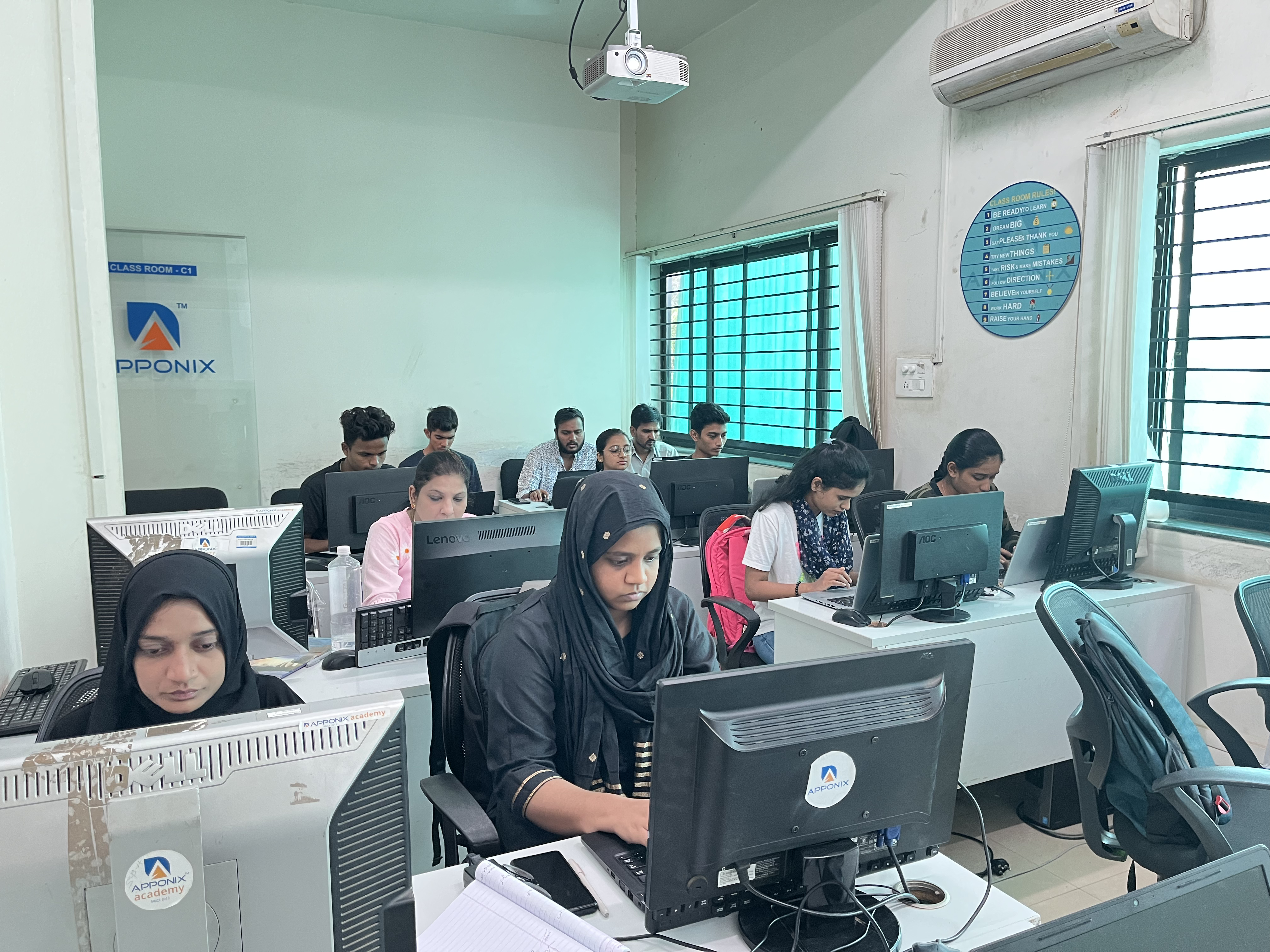

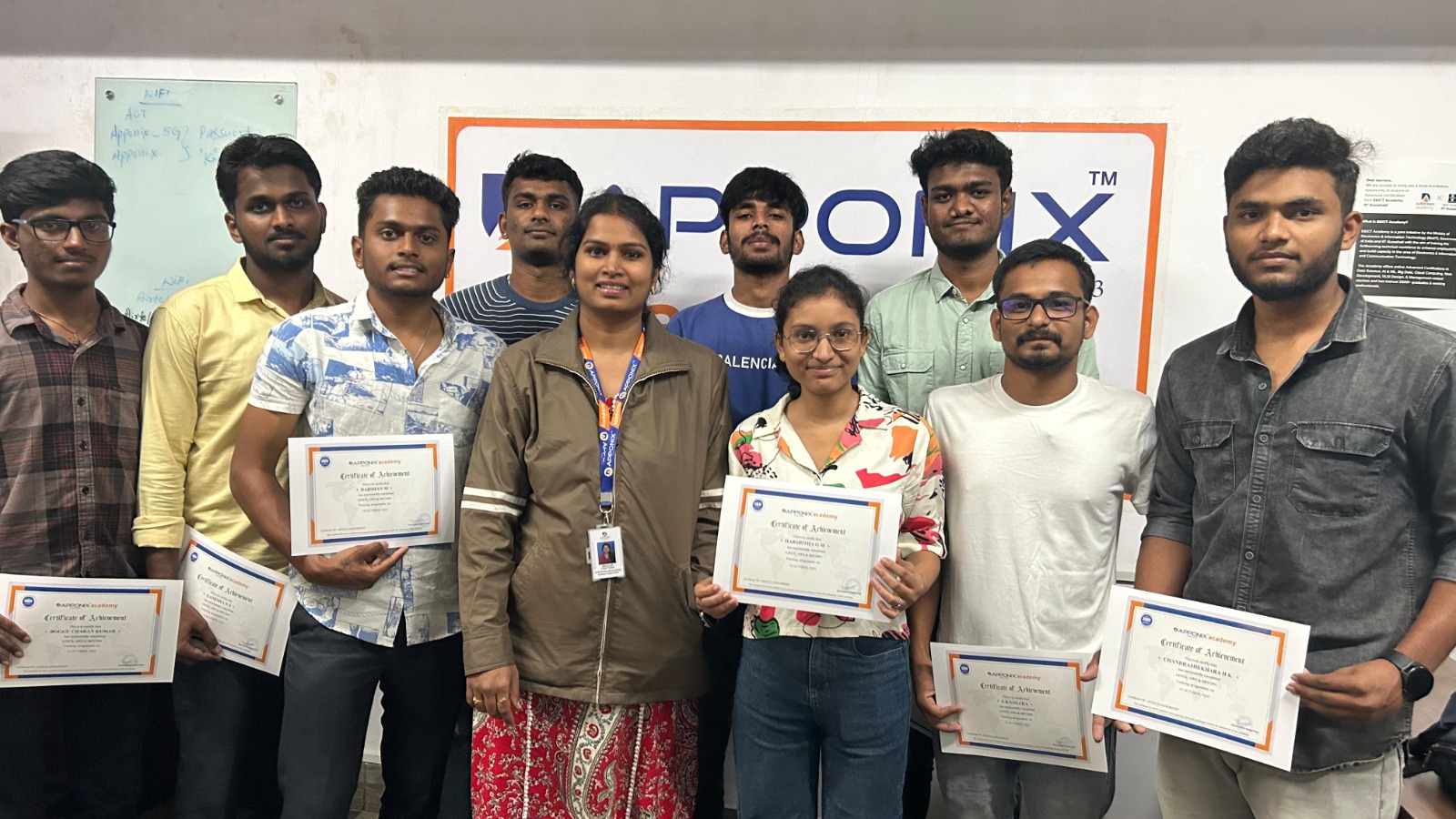
Available Training Options
Online Training
- Interactive Live Training Sessions
- 100+ Hrs Practical Live Online sessions
- Delivered by Senior Data Scientist
- 1 Year Access to Recorded Sessions
- Guaranteed Placement Assurance
- Weekdays & Weekend batches
- Authorized IABAC Training Delivery
- IABAC Certified Data Scientist Exam Voucher (worth Rs 12500)
Master Program in Data Science Training Syllabus
Pre-requisites
Before you enroll for Python for Data Science Courses, you need to have basic knowledge of statistics and previous encounters with prominent programming languages such as Python. Secondly, you need to have an analytical mind –that is all you would need to enroll for Statistics For Data Science Courses.
Master Program in Data Science Course Syllabus
- Course Introduction
- Learning Objectives
- The emergence of Artificial Intelligence
- Artificial Intelligence in Practice
- Sci-Fi Movies with the concept of AI
- Recommender Systems
- Relationship Between Artificial Intelligence, Machine Learning, and Data Science - Part A
- Relationship Between Artificial Intelligence, Machine Learning, and Data Science - Part B
- Definition and Features of Machine Learning
- Machine Learning Approaches
- Machine Learning Techniques
- Applications of Machine Learning - Part A
- Applications of Machine Learning - Part B
- Key Takeaways
- Learning Objectives
- Data Exploration: Loading Files
- Demo: Importing and Storing Data
- Practice: Automobile Data Exploration I
- Data Exploration Techniques: Part 1
- Data Exploration Techniques: Part 2
- Seaborn
- Demo: Correlation Analysis
- Practice: Automobile Data Exploration II
- Data Wrangling
- Missing Values in a Dataset
- Outlier Values in a Dataset
- Demo: Outlier and Missing Value Treatment
- Practice: Data Exploration III
- Data Manipulation
- Functionalities of Data Object in Python: Part A
- Functionalities of Data Object in Python: Part B
- Different Types of Joins
- Typecasting
- Demo: Labor Hours Comparison
- Practice: Data Manipulation
- Key Takeaways
- Lesson-end project: Storing Test Results
- Learning Objectives
- Supervised Learning
- Supervised Learning- Real-Life Scenario
- Understanding the Algorithm
- Supervised Learning Flow
- Types of Supervised Learning – Part A
- Types of Supervised Learning – Part B
- Types of Classification Algorithms
- Types of Regression Algorithms - Part A
- Regression Use Case
- Accuracy Metrics
- Cost Function
- Evaluating Coefficients
- Demo: Linear Regression
- Practice: Boston Homes I
- Challenges in Prediction
- Types of Regression Algorithms - Part B
- Demo: Bigmart
- Practice: Boston Homes II
- Logistic Regression - Part A
- Logistic Regression - Part B
- Sigmoid Probability
- Accuracy Matrix
- Demo: Survival of Titanic Passengers
- Practice: Iris Species
- Key Takeaways
- Lesson-end Project: Health Insurance Cost
- Learning Objectives
- Feature Selection
- Regression
- Factor Analysis
- Factor Analysis Process
- Principal Component Analysis (PCA)
- First Principal Component
- Eigenvalues and PCA
- Demo: Feature Reduction
- Practice: PCA Transformation
- Linear Discriminant Analysis
- Maximum Separable Line
- Find Maximum Separable Line
- Demo: Labeled Feature Reduction
- Practice: LDA Transformation
- Key Takeaways
- Lesson-end Project: Simplifying Cancer Treatment
- Overview of Classification
- Classification: A Supervised Learning Algorithm
- Use Cases
- Classification Algorithms
- Decision Tree Classifier
- Decision Tree: Examples
- Decision Tree Formation
- Learning Objectives
- Choosing the Classifier
- Overfitting of Decision Trees
- Random Forest Classifier- Bagging and Bootstrapping
- Decision Tree and Random Forest Classifier
- Performance Measures: Confusion Matrix
- Performance Measures: Cost Matrix
- Demo: Horse Survival
- Practice: Loan Risk Analysis
- Naive Bayes Classifier
- Steps to Calculate Posterior Probability: Part A
- Steps to Calculate Posterior Probability: Part B
- Support Vector Machines: Linear Separability
- Support Vector Machines: Classification Margin
- Linear SVM: Mathematical Representation
- Non-linear SVMs
- The Kernel Trick
- Demo: Voice Classification
- Practice: College Classification
- Key Takeaways
- Lesson-end Project: Classify Kinematic Data
- Learning Objectives
- Overview
- Example and Applications of Unsupervised Learning
- Clustering
- Hierarchical Clustering
- Hierarchical Clustering: Example
- Demo: Clustering Animals
- Practice: Customer Segmentation
- K-means Clustering
- Optimal Number of Clusters
- Demo: Cluster-Based Incentivization
- Practice: Image Segmentation
- Key Takeaways
- Lesson-end Project: Clustering Image Data
- Learning Objectives
- Overview of Time Series Modeling
- Time Series Pattern Types Part A
- Time Series Pattern Types Part B
- White Noise
- Stationarity
- Removal of Non-Stationarity
- Demo: Air Passengers I
- Practice: Beer Production I
- Time Series Models Part A
- Time Series Models Part B
- Time Series Models Part C
- Steps in Time Series Forecasting
- Demo: Air Passengers II
- Practice: Beer Production II
- Key Takeaways
- Lesson-end Project: IMF Commodity Price Forecast
- Learning Objectives
- Overview
- Ensemble Learning Methods Part A
- Ensemble Learning Methods Part B
- Working of AdaBoost
- AdaBoost Algorithm and Flowchart
- Gradient Boosting
- XGBoost
- XGBoost Parameters Part A
- XGBoost Parameters Part B
- Demo: Pima Indians Diabetes
- Practice: Linearly Separable Species
- Model Selection
- Common Splitting Strategies
- Demo: Cross-Validation
- Practice: Model Selection
- Key Takeaways
- Lesson-end Project: Tuning Classifier Model with XGBoost
- Learning Objectives
- Introduction
- Purposes of Recommender Systems
- Paradigms of Recommender Systems
- Collaborative Filtering Part A
- Collaborative Filtering Part B
- Association Rule Mining
- Association Rule Mining: Market Basket Analysis
- Association Rule Generation: Apriori Algorithm
- Apriori Algorithm Example: Part A
- Apriori Algorithm Example: Part B
- Apriori Algorithm: Rule Selection
- Demo: User-Movie Recommendation Model
- Practice: Movie-Movie recommendation
- Key Takeaways
- Lesson-end Project: Book Rental Recommendation
- Learning Objectives
- Overview of Text Mining
- Significance of Text Mining
- Applications of Text Mining
- Natural Language Toolkit Library
- Text Extraction and Preprocessing: Tokenization
- Text Extraction and Preprocessing: N-grams
- Text Extraction and Preprocessing: Stop Word Removal
- Text Extraction and Preprocessing: Stemming
- Text Extraction and Preprocessing: Lemmatization
- Text Extraction and Preprocessing: POS Tagging
- Text Extraction and Preprocessing: Named Entity Recognition
- NLP Process Workflow
- Demo: Processing Brown Corpus
- Practice: Wiki Corpus
- Structuring Sentences: Syntax
- Rendering Syntax Trees
- Structuring Sentences: Chunking and Chunk Parsing
- NP and VP Chunk and Parser
- Structuring Sentences: Chinking
- Context-Free Grammar (CFG)
- Demo: Twitter Sentiments
- Practice: Airline Sentiment
- Key Takeaways
- Lesson-end Project: FIFA World Cup
+91 8050580888
Our Top Instructors
Overview of Master Program in Data Science Training Course
- Our Master's Program in Data Science certification training is designed to provide learners with a comprehensive understanding of data science, from data analysis and modeling to machine learning and data visualization. The program is taught by experienced trainers who are experts in the field, ensuring that learners receive high-quality training that is relevant to industry needs.
- With a focus on practical learning, the program includes hands-on projects and real-world case studies to give learners the skills and experience they need to excel in the field of data science. Upon completion of the program, learners will receive a globally recognized certification that demonstrates their expertise in the field and enhances their career prospects.
- The program is suitable for anyone who wants to pursue a career in data science, including professionals in the field of analytics, software developers, and business analysts. It is also ideal for individuals who want to upskill or reskill to stay competitive in the rapidly evolving field of data science.
Benefits of learning Master Program in Data Science
- Our Master's Program in Data Science offers a range of benefits for learners, including:
- Comprehensive learning: The program covers all aspects of data science, from data analysis and modeling to machine learning and data visualization, providing learners with a holistic understanding of the field.
- Practical training: With a focus on hands-on projects and real-world case studies, learners gain practical experience that prepares them for the challenges of working in the field of data science.
- Experienced trainers: Our experienced trainers are experts in the field of data science, providing learners with high-quality training that is relevant to industry needs.
- Globally recognized certification: Upon completion of the program, learners receive a globally recognized certification that demonstrates their expertise in the field, enhancing their career prospects.
- Career opportunities: The field of data science is rapidly growing, and there is a high demand for professionals with data science skills. Completing our Master's Program in Data Science opens up a range of exciting career opportunities for learners.
Related job roles
- Data Scientist
- Data Analyst
- Data Architect
- Machine Learning Engineer
- Business Analyst
- Data Engineer
- Applied Machine Learning Engineer
- Robotics programmer
- Robotics system engineer
- Robot design engineer
Master Program in Data Science Courses
Why I should be a data scientist?
Because it is rated as one of the top job sectors in terms of career growth opportunities, job satisfaction and pay scale. Furthermore, the demand for data scientists is always high as the number of skilled professionals is comparatively less.
Can I learn data science even if I don’t have any prior knowledge about this field?
Yes, you can learn data science even if you do not have any prior knowledge about this field as we will also take classes on basic concepts of data science.
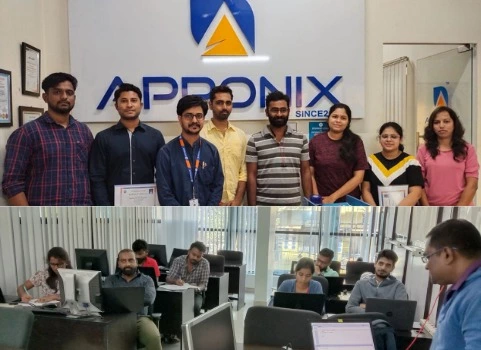
Master Program in Data Science
Is the course easy to understand?
Yes, when you have Apponix by your side as we will cover all the basics and deliver even the complex parts of the curriculum in lucid language.
What can I become after completing this course?
You can become –
- A Data Analyst
- A Data Scientist
- An Analytics Manager/Lead
- A Machine Learning Engineer
- A Statistical Programming Specialist














